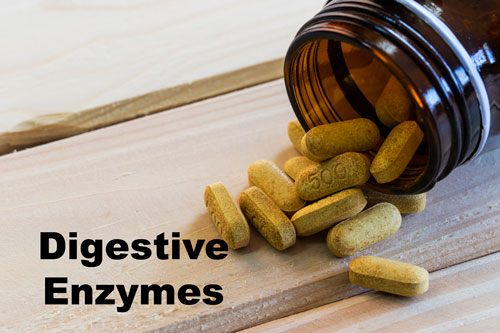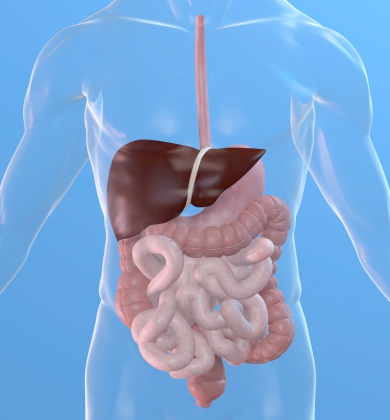Stay Informed
Popular Articles
- Hiatal Hernia: Hidden Cause of Chronic Illness
- Small Intestinal Bacterial Overgrowth (SIBO)
- Applied Lymphology: Unlocking the Secret to Pain Relief
- An Introduction to Constitutional Iridology
- The Low Down on Liver Detoxification
- An Energetic and Emotional Approach to Cancer
- Fat Facts
- Marrow in the Bones
- Blood Type and Nutrition
- Cardiac Herbs: Beyond Hawthorn
Quick Search
The School of Modern Herbal Medicine




Enzymes: The Most Important Supplement I Take
- 12/13/2008
- Categorized in: Nutrition
 I was introduced to plant enzymes in the early 1990s. I had previously tried NSP's Food Enzymes product, which contains pancreatic enzymes, bile salts, hydrochloric acid (HCl) and a couple of plant enzymes. Digestive enzymes are different from plant enzymes because they come from animal sources. They are the same enzymes our body produces to digest food.
I was introduced to plant enzymes in the early 1990s. I had previously tried NSP's Food Enzymes product, which contains pancreatic enzymes, bile salts, hydrochloric acid (HCl) and a couple of plant enzymes. Digestive enzymes are different from plant enzymes because they come from animal sources. They are the same enzymes our body produces to digest food.
Plant enzymes, of course, come from plants. They are the enzymes naturally present in raw foods. They are also present in fermented foods as they are produced by lactobacillis bacteria (probiotic bacteria). These plant enzymes aren't manufactured by the body; they are supposed to be found in the foods we eat.
There's nothing wrong with Food Enzymes, but I don't like doing anything for the body that it should be doing for itself. My thoughts on this are that all chemicals in the body have feedback loops. When levels of a particular substance rise, it shuts down the body's own production. This, in my opinion, tends to make the body “lazy,” and isn't restoring natural function.
However, I do realize that many times, when people's natural digestion has been impaired through illness, injury or age, that this kind of supplementation is helpful. So, I do use Food Enzymes in these kinds of cases. However, for the most part I prefer plant enzymes because they're the enzymes we would be getting in our diet if we were eating in a healthy, natural way.
When I first started taking plant enzymes, I noticed an immediate improvement in my digestion. I think weak digestion has been one of my problems since childhood. That may be because I'm an A Blood Type and A Blood Types tend to have weak digestive systems, but for whatever reason, enzymes were something that made an immediate and obvious improvement for me.
The enzymes I first started using were sold by a network marketing company, whose name I have forgotten. Later, I found an even better brand of enzyme products for professionals only and ordered them through my chiropractor. I also recommended them to clients.
A few years later, NSP introduced a line of plant enzyme products and I started using their enzymes. Unfortunately, they discontinued my favorite plant enzyme product, Leguzyme, due to poor sales. That was a product that helps you digest beans and vegetables that cause gas. I still use NSP's Food Enzymes and Protein Digestive Aid (a hydrochloric acid supplement). I have also used enzyme supplements from several other companies, including some professional products from PHP.
Enzymes are the only supplement that I have taken with any great regularity, and the reason is, that I notice a big difference when I don't take them. So, whenever I've been off them for a while, I notice that my digestive health (and over all health) isn't as good, and I get right back on them. They are the only supplement I've had this experience with.
Why Are Enzymes Important?
 So, why are plant enzymes such an important supplement? Here are my reasons.
So, why are plant enzymes such an important supplement? Here are my reasons.
First of all, no supplement you take is going to do you any good if you can't digest and assimilate it. Neither is eating good food. So, if your digestion is poor, then dietary changes, supplements, etc. aren't going to do you a whole lot of good. I know that when I first started in natural healing, I had to really carefully watch my diet. After I learned about the hiatal hernia from Jack Ritchason, got that problem fixed, and started using digestive enzymes, all my other supplements worked better and I didn't have to be so careful about what I ate.
I find a lot of people have very poor digestion. In fact, in my experience, everyone who is chronically ill has digestive problems (more on that later).
Secondly, when I first got started in natural healing, I was taught, “death begins in the colon.” That's because autointoxication from the waste products in the colon is an underlying cause of numerous diseases. However, if I'm seeing pollution in a mountain stream, then I need to go upstream and look for the source. Problems in the colon begin “upstream” in the stomach. If food isn't digesting properly, it creates waste that builds up downstream in the colon.
 You can cleanse the colon all day long, but if you don't fix what's happening “upstream” in the digestive organs it will just get polluted all over again. Digestive enzymes work “upstream” to keep the colon healthy.
You can cleanse the colon all day long, but if you don't fix what's happening “upstream” in the digestive organs it will just get polluted all over again. Digestive enzymes work “upstream” to keep the colon healthy.
Third, as we grow older, our digestive system tends to get weaker. Hydrochloric acid and enzyme production diminishes with age and is usually quite deficient by the time a person is 50, although it may start becoming deficient in many people much earlier than that. This deficiency of digestive secretions is a major part of protein and mineral deficiencies in the elderly. It is also why Food Enzymes is practically a “must-have” product for senior citizens.
Fourth, plant enzymes have a sparing effect on digestive enzymes. By getting adequate amount of plant enzymes when you are younger, you reduce stress on your digestive organs, which keeps them healthier longer. This has a major anti-aging effect.
Fifth, most Americans don't get a lot of these enzymes in their diet because most of the food they eat is processed, cooked food. In addition, many foods Americans eat contain enzyme inhibitors that actually interfere with enzyme activity. Some of these enzyme inhibitors are chemical additives meant to keep foods from spoiling, but others are naturally-occurring. Plant enzymes not only supplement these natural enzymes missing from our diet, they help to “override” the enzyme inhibitors in people's diets.
This article has two more pages. Use the links below to read the next page.
